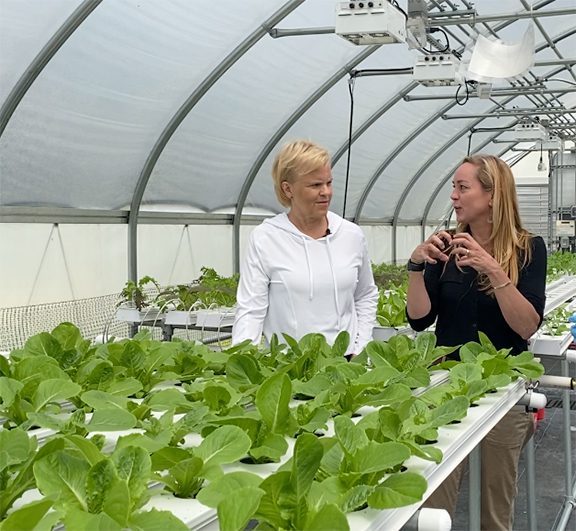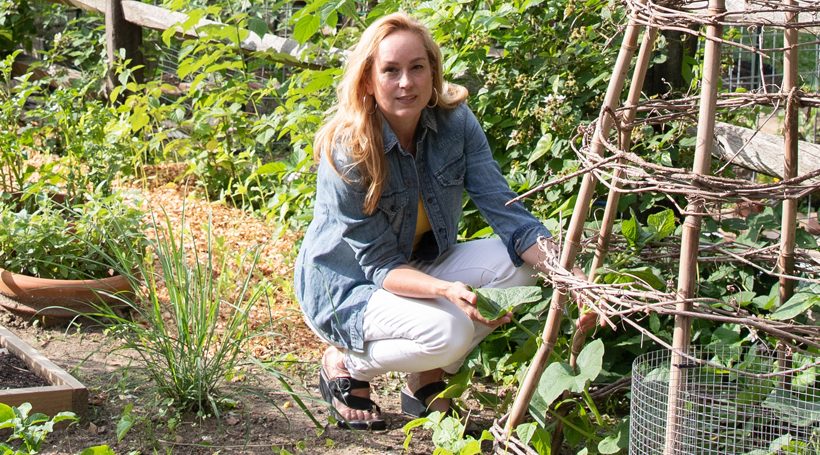Photo: Susan Hennessey
In the summer of 2020, a few months into lockdown, SJ Mag’s Marianne Aleardi reached out to Toni Farmer and asked for help doing something she never thought she could do: become a gardener. In the 2 years since, the pair has documented their backyard experiment in a Facebook series called “The Goal is to Become a Gardener.” There have been moments of comical disaster (that’s usually Marianne) and moments of beautiful environmental growth (that’s usually Toni). Their series – and Marianne’s quest – continues this month on SJ Magazine’s Facebook page.
Many people who faithfully watch the show are gardeners who relate to Marianne’s mistakes and appreciate Toni’s tips. (She holds a Master’s of Environmental Science from the University of Pennsylvania and is an adjunct professor in Rowan University’s School of Earth & Environment.) But Toni also hopes the series inspires some viewers to head out to the backyard and start their own garden, even if it’s just one tomato plant. The benefits of gardening, she says, are many and long-lasting. She filled us in on just a few.
You’ll be happier.
No, really. A recent study from Princeton University showed that gardening is a mood booster. The study – which was conducted prior to the pandemic – found that home gardeners felt high levels of happiness when gardening was measured against other day-to-day activities. “They found the levels of happiness were higher for vegetable gardeners than for ornamental gardeners. This might be because of the relationship you build with your vegetable plants as you watch them grow over the course of the planting season,” Toni says. “Plus, a Harvard study ranked gardening third on a list of pastimes that make people happy. Exercise and sex were #1 & 2.”
You won’t eat chemicals.
“This is probably the most important reason to start a garden,” Toni says. “People aren’t fully aware of how much chemicals are sprayed on our food. The 3 main ingredients most humans eat more than anything else are wheat, corn and soy. They are sprayed many times in the field with glyphosate to kill the weeds. Then they’re sprayed again at harvest to aid in drying so the food can travel well. We know these pesticides cause cancer and they impact your endocrine system which leads to a whole host of health issues. This is not a little bit of research – there are 20 years of far-reaching research on these issues. And when you take those foods home, you can’t wash them – you can’t wash cheerios or pop tarts.”
“Growing your own food gives your family access to healthy organic food,” Toni adds. You’ll exercise without even trying. When you are actively involved in growing your food, Toni says, you are digging, bending over planting, harvesting, getting outside. All of that movement is good for your physical health. “There are even some exercise apps that will put a calorie count on gardening the same way they would on weightlifting or walking,” she adds. “They show you how many calories you can burn in your garden.”
You’ll get more nutrients.
“People don’t realize how complex and global our food chain is,” says Toni. “A lot of the components of our food supply are shipped to China for processing and then back. When food travels, it loses nutrients. We’re also contributing to greenhouse gas emissions with this supply chain. When you grow a garden, there is no footprint. It never hits a truck, never hits a refrigerator, never hits a factory. We can’t do that for everything – I’m not gonna grow Cheerios in my backyard – but I can grow a whole lot of other things.”

This season on “The Goal is to Become a Gardener,” Marianne & Toni visit Camden County’s Sustainability Center. The 10-acre site has a hydroponic greenhouse that supplies vegetables to the Philadelphia Zoo for their birds, apes and monkeys.
Your kids will benefit.
“The amount of research supporting the impact of gardening on children is just blowing up,” Toni says. “Research shows kids who participate in a garden eat more vegetables, are willing to taste vegetables they haven’t tried before, and have a greater sense of well-being.”
You’ll know what a yellow carrot is.
“What color are tomatoes? What color are carrots? Red and orange, sure, but they also come in hundreds of colors, flavors, sizes, varieties,” Toni says. “If you rely on your supermarket, you get what is most profitable or most convenient for them to offer you. When you grow your own, you can start from seed in any variety. I’m growing 14 varieties of peppers right now.”
You’ll be an informed consumer.
“Most people know nothing about where their food comes from, but when you start to grow your own food, you become a much more informed consumer,” says Toni. “You might see a Mexican bean beetle in your backyard, and it destroys all your beans. Then when you show up at the grocery store and beans are very expensive, you’ll put 2 and 2 together instead of just complaining about the price. Informed consumers make better choices and are more likely to support legislation that favors a healthy food supply. Gardeners understand issues like soil erosion and fertilizer-induced algae bloom.

You’ll help reduce food waste.
“This is so important,” Toni says. “We throw away over 35% of the food we grow in the United States. Some of it doesn’t make it off the farm, because Americans don’t like to eat bruised or damaged food. Some is thrown away at the grocery store. Most of it is thrown away in restaurants and households. We bring it home, we cook it, then we don’t eat it all so we throw it out. When you put food waste in your trash can and it goes to the landfill, it creates methane, which is a potent greenhouse gas.”
“But when you garden, you have very little waste. You harvest what you need to eat that day. If you need potatoes and a tablespoon of dill, you harvest that and eat it, rather than having to buy a giant bag of potatoes and a whole bunch of dill. Gardeners often have a compost pile. Any food waste we do have goes right on the compost pile where, instead of creating methane, it creates next year’s garden soil.”
You’ll grow your own food – and that matters now.
It’s been alarming, but if you’ve been to the supermarket lately, you’ve seen empty shelves, so more people are recognizing the significance of backyard gardening, Toni says.
“Vegetable gardens generally have had the reputation of something that retirees do as a hobby,” she says. “But the truth is people around the world have learned to grow their own food out of necessity, because there are food shortages due to climate change, which causes drought, wildfires, intense flooding. As homeowners around South Jersey begin to see more and more empty shelves – because of the war, because of climate change – the idea is going to spread: Maybe I could be growing some food in my backyard. Then people can gain all the benefits we’ve just discussed. It’s a win-win all the way around.”














